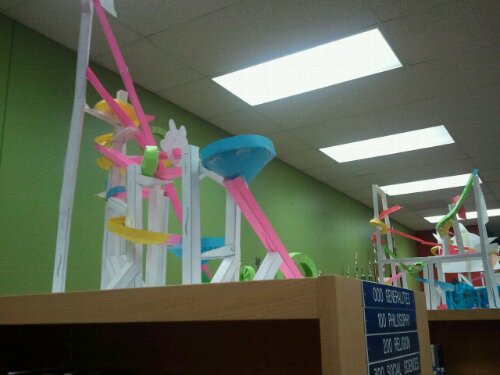Okay, so not really new new because I studied the gamefication of processes in my Masters degree, but it’s still refreshing to see. I’m an avid fan of video games, especially role-playing games, so Ben Bertoli’s classroom management plan, called ClassRealm, caught my attention. I thought that it was going to be something that was online, but no. It’s a structured framework for rewarding positive classroom interactions without directly giving things like behavior points that affect a student’s grade. I really like the community aspect of the alliances. (I also can relate playing music for the Random Encounters. Any of my past 8th graders will be able to tell you about the Bubble Smackdown test prep fight music.)
Here’s a glance at some of what Bertoli’s testing out in his classroom:
1. ClassRealm is completely voluntary. If you don’t want to participate you don’t have to.
2. XP is the backbone of ClassRealm. Every 10 XP you earn pushes you to the next level. Every one starts at level 1.
3. XP can be obtained by doing simple things such as:
• Answering questions
• Joining in class discussion
• Working hard on an assignment
• Helping others
• Participation in general
• Random Encounter Friday (explained below)
• Gaining achievements (explained below)
4. Achievements are gained by completing specific tasks. For example: a student can obtain the “Bookworm” achievement by reading two unassigned chapter books and explaining the plot and characters to me.
5. Each achievement has four levels – bronze, silver, gold, and master. Each level is harder to reach than the one below it.
6. Boys are pitted against girls. The gender that can acquire the most achievements by the end of the year will win extra recess and an ice cream party during lunch.
7. Each Friday will be Random Encounter Friday. Every one who wants to battle will put their name in a hat. I will draw out two names and they will battle. Students will be asked a question. I will repeat the question twice and then start battle music. The first to write the correct answer on the board and put their hands up will win XP. You can only answer once. Question subjects are chosen at random.
8. Students may join in alliances of up to six ClassRealm citizens. The alliance with the highest combined level at the end of the year wins a pizza party.
9. All info, except for the current amount of XP each student has, will be listed online and in the classroom for students and parents to see.





